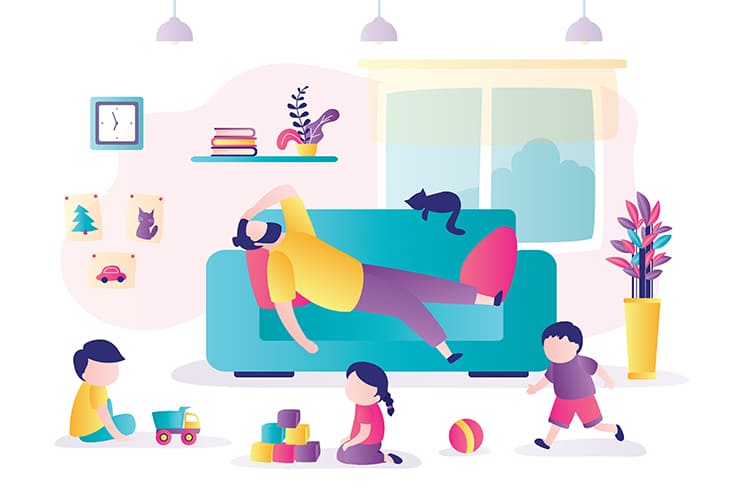December 21, 2020
By Anthony Nedelman, Ph.D.

Like most men, I find myself unable to keep all the plates spinning nicely on their poles.
As a husband, father of a three-year-old and a four-month old, and a working professional, the only time I can get anything done for me is while everyone is asleep. Which is why I snuck downstairs at 5:00 am to work on this very important topic: dads need help.
More specifically, dads need help with their mental health.
The Modern Dad
The modern dad does way more today than the dads of our ancestors. Dads are pushing the boundaries of “manly” stereotypes and doing activities that our great-grandfathers would probably chuckle at. A few examples:
This is the abbreviated version of a very long list. Add occupational responsibilities and house/car maintenance, and it’s no surprise that dads today are struggling to keep up with life’s demands. I can hear the not-so-silent cries of the partners of these men shouting, “Welcome to my world!”
It’s a valid point that I don’t want myself or any man to forget. Mothers have long played the dual role of homemaker and full-time employee. Many work full-time, come home and clean, care for the kids, rinse and repeat. For whatever the reason, many dads don’t have the same knack for juggling all of those responsibilities. It is because of this that many are feeling the weight start to burden our mental health.
How Paternal Mental Health Affects the Family
Dads’ emotional well-being is on the decline and, quite frankly, it is being overlooked. Recent research has demonstrated that when fathers’ mental health declines, so does the quality of their co-parenting relationships. Families with fathers who struggle with mental health issues, particularly during early childhood, tend to have children with more difficulties managing their emotions and behaviors.
In other words: Fathers affect the quality and stability of the family.
It seems so intuitive, yet, psychological research largely undervalues and/or fails to acknowledge or incorporate dads. This spans the entire spectrum of fatherhood — from the perinatal period throughout all of the major milestones of being a dad — fathers are largely absent from psychological research.
It is essential for fathers to seek care when they need it, however, so many don’t. A few likely explanations include:
Men are left to figure things out when it comes to the transition to fatherhood. We are, as Dr. Chuck Schaeffer puts it, in the Dark Ages when it comes to supporting new fathers. Paternal mental health is a newer field of study, and a lot of the data is suggesting that the transition impacts father’s mental health just as much as mothers.
Men are poorer treatment-seekers. This relates to the deeply ingrained cultural ideas about masculinity and how we as men are “supposed” to feel and behave. At a young age, boys and teens are told to “walk it off” and “man up.” They are taught, sometimes explicitly sometimes not, that showing emotions is a sign of weakness. Thus, they grow up into men, and subsequently fathers, who struggle with acknowledging, communicating and managing their emotions.
Men’s options are a little more limited in mental health clinicians. Clinicians are not often equipped to navigate the complexities of working with men and boys, and there are a number of gender-specific issues that men and boys need attending to. The mental health landscape is primarily made up of clinicians who have been trained almost solely with female clientele (men don’t seek treatment at the same rate that women do). Men don’t have as many options — and the options they do have may not be best suited to their needs.
With these barriers in mind, it is essential for us to acknowledge paternal mental health and to encourage dads, and all men, to seek mental health care when they are struggling.
So, before I go back to the world of laundry and play dates, let me leave my fellow fathers with this:
You have the power to influence great change in your family and even the future generations that come after you. The decisions you make today, positive or negative, are being evaluated by your children. Set the example: when you need help, ask for it; feelings are real, don’t ignore them; and, you are no less a man for doing so.
Anthony Nedelman, Ph.D., is a fellow in the Department of Family Medicine at MetroHealth Medical Center in Cleveland. Dr. Nedelman is a strong advocate for men’s health and is in the process of writing a book that addresses paternal mental health. You can find him on Facebook and Instagram, although he admits he is too tired chasing his kids to post as much as he’d like.
We’re always accepting submissions to the NAMI Blog! We feature the latest research, stories of recovery, ways to end stigma and strategies for living well with mental illness. Most importantly: We feature your voices.
LEARN MORENAMI HelpLine is available M-F, 10 a.m. – 10 p.m. ET. Call 800-950-6264,
text “NAMI” to 62640, or email. In a crisis, call or text 988 (24/7).